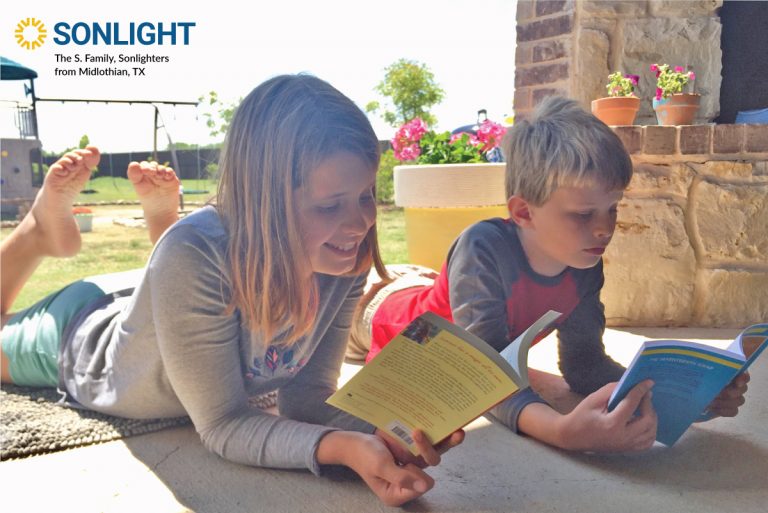“I’m failing my child.”
This thought barraged my mind the first year of homeschooling my daughter. As I fought to establish a school routine and complete assignments, I was met by the fierce will of a 5-year-old kindergartener who had other ideas about how to spend her day. Most days ended in both of us crying over schoolwork. I felt completely inadequate as her teacher, and wanted to give up.
I quickly became my own biggest critic.
Instead of enjoying the flexibility and discovery of learning in homeschooling, I became a micromanaging perfectionist and focused on everything we were not doing. I couldn’t teach her. I couldn’t get her to listen. These thoughts severely threatened my decision to homeschool.
As I look back over my seasons of doubt, I realize God has used these times to shape me. To see God’s truths, I needed to identify what was causing my fear of failure. Here are three ways I have fallen into cycles of self-criticism.
1. Unrealistic Expectations
Starting on our homeschool journey, I had only the public school model of education. I expected to get through a daily checklist of work while my perfect kindergartener listened intently to every word and attempted every assignment. I’m sure all the veteran homeschoolers are laughing right now.
Most days were spent with me reading while she ran around in circles, seemingly paying no attention to anything I was saying. I don’t know how many times I told my husband, “I can’t do this anymore. Nothing I’m doing is getting through to her.”
My expectations were certainly unrealistic in the beginning. My daughter was too active to sit still and listen. She learned while she was in motion. I still have to adjust my expectations to more realistic goals as we go and circumstances change.
2. Comparison to Others
It’s also easy to compare our progress to others. Planning for that first year, I remember questioning kindergarten teachers to determine learning expectations. One teacher mentioned that her class was reading by Christmas break.
While I understood that each child is unique in their development, and that the whole class probably wasn’t reading C.S. Lewis by the middle of their kindergarten year, I still fretted when we were struggling with simple words. I wondered how I could have a college degree but couldn’t teach my daughter how to read sit or sat. My pride was certainly being broken during this time.
3. Voices and Opinions of Others
Then voices of others in our community began to plant further seeds of doubt in my mind. Teachers from our church would comment on how perfectly behaved and well-mannered my daughter was during class. Surely we weren’t talking about the same girl, right? How could she be so well-behaved for others, and not me?
Words meant for praise I turned into self-criticism.
I thought, maybe if I just sent her to public school, then she would have to sit and listen to a teacher and in the long run get a better education.
My husband and I even sought counsel from others, and one person advised that a school setting might give her a better structure. This opinion caused me to question my ability to continue our homeschool education. While seeking advice from others can be wise, it is also important to weigh it against what you believe God is directing for your family.
Recognize God’s Truths to Silence My Biggest Critic
As I began to identify my negative thought patterns, I realized that ultimately my fear of failure was rooted in the lies of the enemy meant to undermine the work God had called me to accomplish with my child. I needed to replace these lies with God’s truths. I had reached the end of my own capacity and knew if we were going to continue I needed His strength. I found encouragement in words written in Homeschool Bravely by Jamie Erickson:
“…your difficult one is a work in progress, but so are you. Homeschooling with its oftentimes moment-by-complicated-moment investment can be one of the many tools God can use to bring you to completion.”
These words cut at the very lies the enemy had tried to use to make me feel like a failure and give up. I am a work in progress, and I don’t have to be the perfect teacher. I don’t have to check all the boxes on my daily planner. I just have to be yielded to God’s call to teach my child. He’s already decided I’m the best parent for my daughter. He planned it all before she was even born. In Ephesians 2:10, the Bible says that God has prepared my good works beforehand. I simply walk in them. I can rest in knowing that He has prepared the way for me.
Celebrate Accomplishments
As I reflect on what my daughter and I have learned over the last few years of homeschooling, I can truly celebrate our victories and silence the inner voice of my biggest critic. I realize that we were learning even though it may not have exactly matched my initial picture of schooling. This revelation occurred when she began mentioning tidbits from stories and lessons I had read to her a few weeks prior. Apparently she didn’t need to sit still to pay attention.
And she did learn to read. Through all of the different phonics and reading program methods I tried, the only constant during this time of struggle was the Read-Alouds in Sonlight's History / Bible / Literature programs. Having historic figures like Mary in Mary on Horseback or Louise Braille in Out of Darkness brought inspiration to our studies. And then, after being consistent in reading aloud to her, something clicked, and she started reading on her own. I am truly humbled when anyone comments on how well she reads now, because I remember our times of struggle. I am thankful I stayed committed to teaching her despite my fear of failure.
Each year brings its own unique challenges in homeschooling. Amidst new frustrations and learning challenges (math anyone?), it can be easy to fall into another pattern of self-doubt. However, I am quicker to acknowledge these thoughts as lies from the enemy, and ask God to point me to His truth. God is using every circumstance to shape us and point us to our complete dependence on Him. So, when you doubt yourself, know that you can do all things through Christ who strengthens you (Philippians 4:13).









